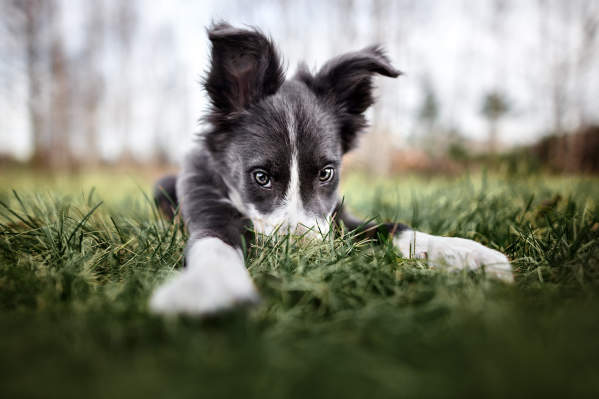If you notice that your new puppy won't eat or appears to not have an appetite, you might be concerned and unsure of what to do next.
While it's possible that there's a medical reason behind your puppy's refusal to eat, in the absence of other symptoms, it's also completely feasible that the cause is something less severe. It might be difficult to figure out what's going on, in which case it's a good idea to speak to your vet or one of our Pros at Pawp to help you decide on the next best step.
Let's explore some common reasons why your puppy isn't eating and what you can do to help get them back on track.
Reasons why your puppy won't eat
Illness
Illness is one of the most common reasons why a puppy isn't eating. It's very important to look for other symptoms to help guide you. Symptoms like vomiting, nausea, diarrhea, lethargy, weakness, disinterest in their surroundings, or wobbliness when they try to walk or get up are indications of a more serious cause behind their refusal to eat.
It's important to take your puppy to the vet if you see any other symptoms or if your puppy simply refuses to eat for 24 hours. Your vet will be able to do a full physical examination, determine the cause for the inappetence, and start your puppy on the correct treatment.
Intestinal parasites
Young puppies can get intestinal parasites from their mom. If you find your puppy is not eating as well as you would expect, monitor the stool to make sure it's normal in appearance and you don't see any worms in the stool.
It's always a good idea to schedule a wellness visit with your vet for your new puppy. You can also consider taking a stool sample to your vet if you're concerned about intestinal parasites, as your vet can have the stool checked.
They're still learning to eat
Puppies are usually weaned at around 6 weeks of age, although they can start to eat at around 4 weeks. If your puppy is still very young, they might still be learning to eat and figuring out their likes and dislikes.
Ask the breeder or shelter where you got your puppy what they were eating before. Try to feed the same food for the first few days, even if you're not planning to use that specific food. Once you have your puppy settled in their new home and eating well, you can slowly transition to the food you want to feed them over 7-10 days. This can greatly reduce stress as well as gut upsets during those first few days.
You can also consider mixing the food with a puppy milk replacer to encourage them to eat. Slowly reduce the amount of milk replacer over a few days to get them used to the consistency of more solid food.
They don't have a routine yet
It's generally recommended to feed your puppy at set meal times. Young puppies will need to be fed around 4-6 times per day, but this can be reduced to about twice daily by the age of four months.
The mealtimes should be kept to specific times, as setting a routine for your new puppy will help them know what to expect and can help build trust in you and security for them. It might take a while for them to learn the new routine, but most puppies are quick learners when it comes to food!
There's a food or food bowl issue
Sometimes, puppies just don't like the food you're feeding them. The solution could be as simple as making a flavor or brand swap. It's best to chat with a vet about the food they recommend for your puppy, and then slowly transition them from their old food to their new food.
Your puppy might also not like the type of food bowl you're using. Stainless steel bowls are usually a good choice, as they do not tend to retain smells and are easy to clean.
Be sure to clean your puppy’s bowl after every meal. Some puppies can be very sensitive and might refuse to eat from a dirty bowl.
Your puppy is stressed out
Another reason your new puppy isn't eating is that they're experiencing stress. Moving away from their littermates and trying to get acclimated to a new environment can cause a pup to feel overwhelmed and anxious.
They may start to show more interest in food with time, however, it's important to try to reduce as many stressors for your puppy as possible.
Place your puppy’s food bowl away from areas where people tend to walk. If you have other pets in the house, make sure your puppy is fed separately from those pets. It might even be necessary to feed your puppy in a different room for the first few days until they get used to their new surroundings and housemates. In extreme cases, you can hand-feed your puppy, although you should try not to do this for more than a few days, as some pups will get used to only eating when fed by hand.
If you find your puppy appears very anxious, you can consider using natural pheromones to help them relax. Pheromones are usually available as a spray, diffuser, or collar you can put around your puppy’s neck.
Your puppy is teething
Teething usually takes place between the ages of 4- 6 months. Teething puppies have interesting habits. While they might not be interested in eating their own food, they might have gained a sudden interest in ingesting something else in your house—namely, something they're not supposed to be eating.
This is relatively normal for a teething pup, but it's essential that you redirect their teething to something that is more appropriate for them—like a teething toy. This will help ensure that the behavior does not carry over from puppyhood into their adult years.
If you think teething might be the problem and your puppy seems to be in discomfort when chewing, you can try to give them some soft food or soften their dry food with warm water and let it cool before feeding them. This should make it easier for them to chew.
Your puppy is not food motivated
While most puppies will devour their food as fast as they can, there is the odd puppy that just does not seem to be food motivated. These puppies are generally extremely active and interested in their surroundings, and would much rather be running around or playing than taking some time to eat a meal.
These puppies can sometimes benefit from puzzle feeders which require an action to be performed for food to be released. There are many different types of puzzle feeders available, so you might have to alternate between a few to keep your pup interested.
This is not an easy cause to identify, so be sure to have your puppy examined for any more serious causes of inappetence before you start trying puzzle feeders.
If you're confused or uncertain about the reason your puppy is not eating, speak to a pro at Pawp to help you figure out what might be going on and what you need to do next.

Reviewed and fact-checked by
Dr. Mari, DVM at Pawp
